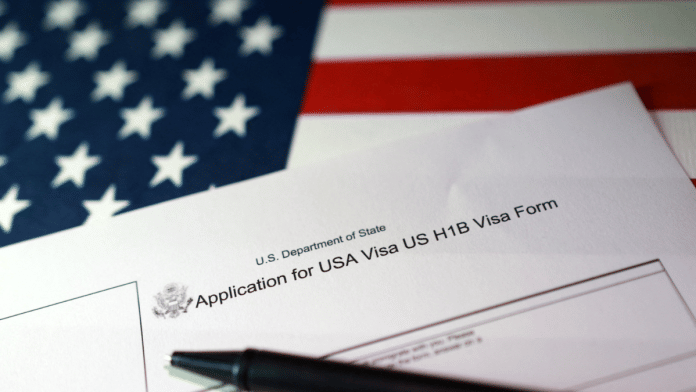Thank you dear subscribers, we are overwhelmed with your response.
Your Turn is a unique section from ThePrint featuring points of view from its subscribers. If you are a subscriber, have a point of view, please send it to us. If not, do subscribe here: https://theprint.in/subscribe/
Recent H-1B visa changes, including a new $100,000 one-time fee for fresh applicants starting September 21, have sparked concern across India’s IT sector. However, this policy shift may ultimately strengthen India’s technology landscape through three strategic transformations: accelerated AI-powered service innovation, domestic market focus, and engineering talent diversification beyond traditional IT services.
From Labor Arbitrage to AI-Powered Innovation
Trump’s visa restrictions arrive as Indian IT companies were already reducing H-1B dependency. The top seven Indian IT firms saw H-1B approvals plummet from 14,792 in FY2015 to 7,299 in FY2024—a 51% decline. Companies like TCS, Infosys, and Wipro have simultaneously increased local hiring and offshore delivery models.
This transition coincides with India’s embrace of agentic AI—autonomous systems that can perceive situations, reason through options, and execute decisions with minimal human oversight. Nearly half of Indian enterprises are now testing these solutions, signalling a fundamental shift from traditional outsourcing to intelligent automation.
The timing creates opportunity. Indian IT firms possess decades of problem-solving expertise, troubleshooting databases, and operational insights that can be transformed into AI-powered Software-as-a-Service products. These solutions can serve global markets without visa complexities, creating scalable revenue streams resilient to immigration policy changes.
Redirecting Talent Toward Domestic Transformation
The visa restrictions free up skilled professionals previously bound for overseas assignments to address India’s own infrastructure inefficiencies. Despite successes like Aadhaar and UPI, significant digitization gaps persist across government services.
Digital India’s ₹14,903 crore budget allocation (2021-26) provides a framework for systematic improvement. However, implementation remains uneven, creating opportunities for private IT companies to contribute meaningfully to domestic transformation.
A targeted Production Linked Incentive scheme for government digitization could accelerate this process. The PLI model has proven successful across manufacturing sectors, generating committed investments of ₹1.76 lakh crore with demonstrated results in electronics, pharmaceuticals, and telecommunications.
Such a scheme would reward IT service providers based on measurable improvements in government department efficiency—reduced processing times, enhanced transparency, optimized costs. This performance-based approach would create sustainable business models while reducing overseas market dependence.
Engineering Diversification Beyond IT Services
The current disruption creates an inflection point for India’s engineering talent to expand beyond traditional software services into sectors critical for national development.
Climate technology presents enormous opportunities. India’s renewable energy targets and net-zero commitments by 2070 require sophisticated solutions in energy storage, grid management, and sustainable manufacturing. Engineers previously focused on software services could redirect capabilities toward solar panel efficiency, wind energy optimization, and smart grid technologies.
Manufacturing automation represents another frontier. The electronics manufacturing sector alone has seen 146% production growth under PLI schemes, indicating technology-driven potential. Indian engineers’ systems thinking and technical rigor, demonstrated globally in IT projects, could drive innovation in IoT integration, advanced analytics, and urban infrastructure development.
Economic Resilience Through Strategic Diversification
The H-1B restrictions may ultimately strengthen India’s economic resilience by encouraging diversification across multiple dimensions: geographic markets, service offerings, and technological capabilities.
Companies are already expanding beyond the US market, with significant opportunities in Europe, Asia-Pacific, and emerging economies. This geographic spread reduces vulnerability to single-market policy changes while creating balanced revenue streams.
The shift toward AI-powered services builds more defensible competitive positions compared to traditional labor arbitrage models. Companies developing proprietary AI solutions create sustainable advantages less susceptible to external policy pressures.
Domestic market emphasis creates more balanced economic foundations. As Indian businesses and government agencies modernize technology infrastructure, they generate demand for sophisticated IT services that can absorb technical talent while contributing to national productivity growth.
Policy Recommendations
To maximize transition benefits, coordinated government-industry action is essential. The government should establish a Digital Transformation PLI scheme rewarding measurable public service improvements with specific metrics for processing time reduction and cost optimization.
Industry associations should facilitate knowledge sharing to help companies transition from traditional service models to AI-powered solutions, including frameworks for converting operational expertise into scalable software products.
Investment in R&D infrastructure is crucial for supporting the transition from services to intellectual property creation, with policies incentivizing private sector R&D spending and industry-academic collaboration.
Strategic Opportunity
The $100,000 H-1B fee increase—clarified as a one-time charge for new applications only, not affecting existing holders or renewals—represents more than policy change. It marks a potential turning point in India’s technological evolution.
By viewing restrictions as catalyst rather than obstacle, Indian companies can accelerate transformations necessary for long-term competitiveness. The combination of AI-powered delivery, domestic focus, and engineering diversification creates foundations for resilient, innovative growth.
While short-term adjustments prove challenging, long-term benefits of reduced external dependency and stronger domestic capabilities significantly outweigh immediate disruption. Success requires embracing change rather than resisting it—companies adopting this mindset will likely emerge as leaders in India’s next technological development phase.
About the Author
Pratik Modi is CEO of FI Digital and Fristine Infotech, leading digital transformation consultancies specializing in enterprise customer experience optimization, AI consulting, SaaS implementation, and business process automation. The companies serve clients across Australia, India, and international markets, with particular expertise in Zoho ecosystem solutions and advanced analytics platforms for operational efficiency enhancement.
These pieces are being published as they have been received – they have not been edited/fact-checked by ThePrint.


